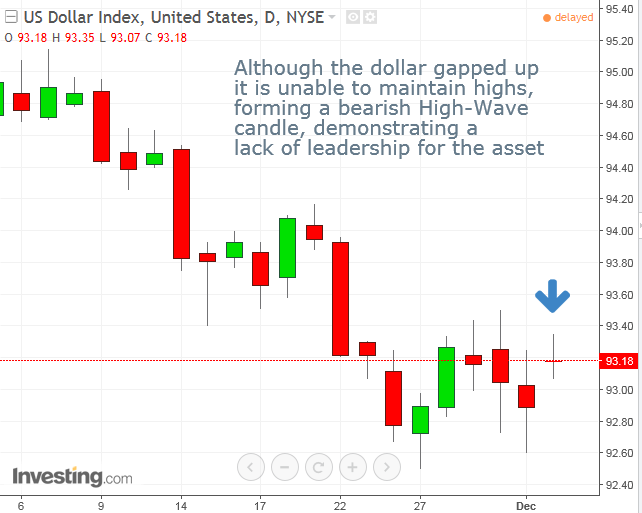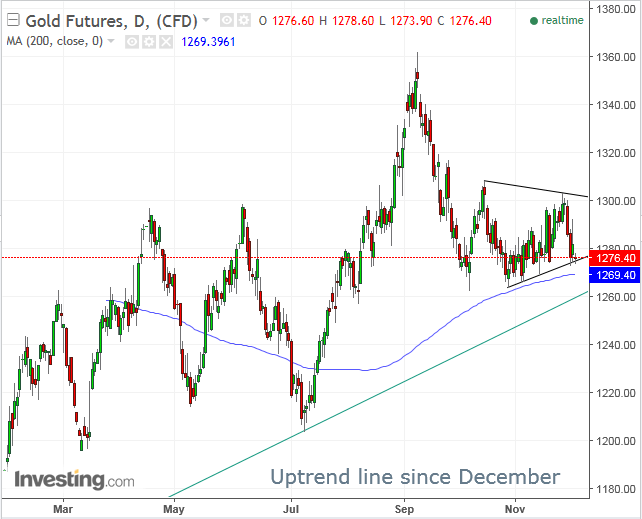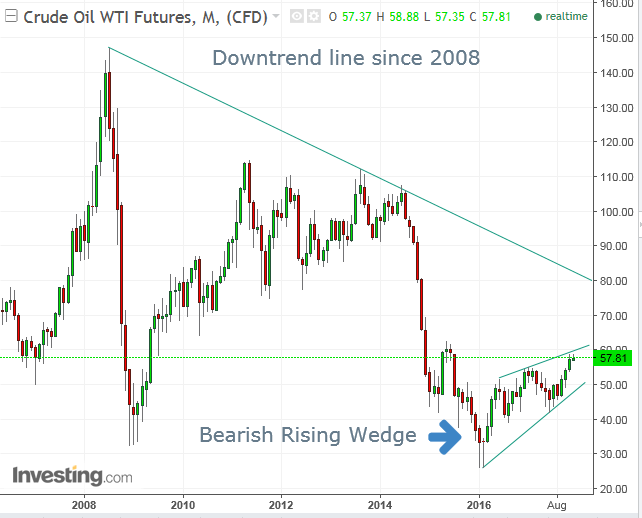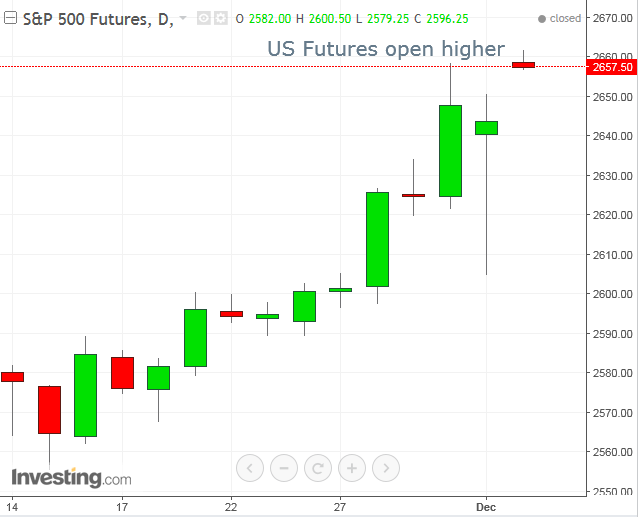by Pinchas Cohen
Key Events
The dollar gapped up this morning at the start of weekly trading, indicating there were only buyers but no sellers at current levels for the US currency—after the US Senate passed corporate tax cut legislation on Saturday, when markets were closed.

That left FX traders with an itch over the weekend they couldn't scratch until today's opening session. Buyers had to seek willing sellers at higher prices. The greenback jumped, ending a 3 week slide, erasing most of Thursday's and Friday's daily losses.
Gold, at least technically, seems to be on the verge of a leap higher as well.

The yellow metal—sometimes regarded as the antithesis of the USD—has reached a triple-support: (1) trading range bottom, (2) 200 dma and (3) uptrend line since December, suggesting a dollar decline is on the way. There is an argument to be made, on the other hand, that the current trading range may be forming a continuation triangle, which on a downside breakout would send the price of gold lower.
Both the Senate and House tax reform bills are fundamentally dollar supportive. It will be interesting to see whether the precious metal or the global reserve currency will push higher, since they generally perform in negative divergence.
Global Financial Affairs
The long awaited tax legislation—a key component of President Donald Trump's campaign promises—has overshadowed the ongoing investigation into possible collusion between the President's aides and Russia.
US equity index futures, including S&P 500 Futures joined the rally. SPX Futures opened 0.62 percent higher, as of 3:52 AM Eastern.
Initially yields spiked as Treasuries were sold off and investors rotated out of risk-off into risk-on. Over the past few hours, however, yields have been falling, possibly on the supposition that more profitable companies would boost the US economy.
With the exception of the Japanese indices, the TOPIX and Nikkei 225, which closed lower, Asian benchmarks advanced. This is noteworthy.
Japanese equities, which had hit 25-year highs in recent weeks, have retreated and may need to provide additional incentives to convince investors they're still a buying opportunity. A parallel could be drawn with US equities.
Relative to global equities, US shares—after a staggering string of 56 records this year for the S&P 500 Index alone—are now very highly valuated. In tandem with the strengthening dollar they could be considered quite expensive. US markets require tax cuts and perhaps other bullish news to support these still-increasing prices, in order to give investors faith that current prices should, in fact, not be considered expensive, since they can still go higher.
Spurred by the generally positive Asian session, the European Stoxx 600 opened 0.65 percent higher on a gap.
While this morning's action, after last week's positive finish in the US, was major news for equities, currencies and bonds, and may even be considered a possible game-changer, the elevated appetite for risk didn't help the slipping price of oil. It fell to under $58 earlier today and continues to slide as of this writing.

So far, our macro analysis of oil's price being pressured to stay below $60, published here in early November, is proving true. According to the theories of technical analysis, oil should return to a downtrend.
Up Ahead
- On Monday, euro-area finance ministers discuss the future of the region, vote for a new president, and debate Greece’s bailout review in Brussels.
- The European Commission College of Commissioners discusses Brexit on Wednesday and will likely make its recommendation on whether sufficient progress has been made to move negotiations onto the future relationship. The U.K. is aiming to win the approval of the other 27 EU states at the leaders’ summit on Dec. 14.
- The U.S. faces a partial government shutdown after money runs out on December 8 if Congress can’t agree on a spending bill by then.
- U.S. employers probably hired at a robust pace in November as the unemployment rate held at an almost 17-year low. The Labor Department’s jobs report on Friday may also show a bump in average hourly earnings.
- Countries setting monetary policy this week include Australia, Brazil, Canada, India and Poland.
Market Moves
Stocks
- Euro Stoxx 50 futures rose 1 percent in early European trading.
- Japan’s TOPIX and Nikkei 225 Stock Average both finished the session down 0.5 percent.
- Australia’s S&P/ASX 200 Index was flat.
- South Korea’s KOSPI rose 1 percent.
- Hong Kong’s Hang Seng Index advanced 0.5 percent as Chinese shares traded in the city jumped.
- The Shanghai Composite Index fell 0.2 percent.
- The MSCI Asia Pacific Index fell slightly.
Currencies
- The dollar rose against major FX peers on Monday in Asia, with the Dollar Spot up 0.29 percent, paring a 0.32 percent advance.
- The euro lost 0.5 percent to $1.1841.
- The yen slid 0.8 percent to 113.04 per dollar.
- The Australian dollar fell 0.2 percent to 75.81 U.S. cents.
Bonds
- The yield on 10-year Treasuries rose five basis points to 2.41 percent, reversing a decline on Friday.
- German 10-year bund yields were up three basis points at 0.34 percent.
Commodities
- West Texas Intermediate crude slid 0.7 percent to $57.91 a barrel.
- Gold fell 0.6 percent to $1,273.34 an ounce.

